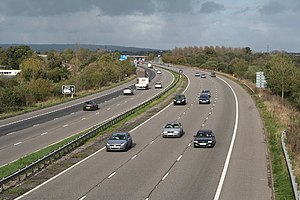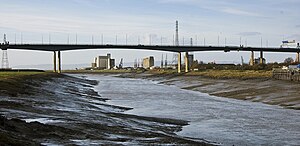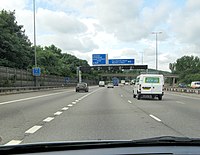M5 motorway


The M5 is a motorway 163 miles long, running from Exeter in Devon to West Bromwich in the Staffordshire Black Country. The M5 defies the London-centred road network, running somewhat perpendicular to the London-bound roads, linking the West Country directly to the western Midlands, linking into a smaller hub of routes around the conurbation of Birmingham and the Black Country.
Its route, according to junction numbers, begins north of West Bromwich in Staffordshire, where it meets Junction 8 of the M6, and then heads south through the Black Country, the Midlands and on to end south of Exeter in Devon.
Route

Heading south-west, the M5 runs east of West Bromwich and west of Birmingham through Sandwell Valley. Junction 1 surrounds a surviving gatehouse from the former Sandwell Hall. It continues past Bromsgrove in Worcestershire (and from Birmingham and Bromsgrove it is part of the Birmingham Outer Ring Road).
Leaving the towns, it enters rural Worcestershire, passing Droitwich Spa and Worcester, then into Gloucestershire, where it passes Tewkesbury, Cheltenham, Gloucester and Bristol.
North of Bristol the M4 crosses the M5 (at Junction 15) in a remarkable junction system. Junction 15 is a large four-level stack interchange, called the Almondsbury Interchange, designed to cope with traffic joining the heavy traffic of the M4.
Soon afterwards the M5 passes between Bristol itself and Avonmouth, leaping over the Avon and into Somerset on a long viaduct providing wide views over Avonmouth's docks and the broad estuary of the Severn. This, the Avonmouth Bridge, between Junctions 18 and 19, is often a bottleneck during heavy traffic periods, due mainly to lane drops at either ends of the bridge for the respective junctions, and the sharp angle in the centre of the bridge, which causes larger vehicles to slow considerably.[1]
Entering Somerset, there are split-level carriageways where the M5 ascends the hill sides above the Gordano Valley, between Portishead, Junction 19 and Clevedon, Junction 20.
Between Junction 21, Weston-super-Mare and Junction 22, Burnham-on-Sea, the M5 passes by an isolated landmark hill called Brent Knoll. The Willow Man sculpture, visible from both carriageways, acts as a landmark just to the south of Junction 23.
The M5 follows the route of the A38 road quite closely. The two deviate slightly around Bristol and the area south of Bristol from Junctions 16 to the Sedgemoor services north of Junction 22. While the A38 goes straight through the centre of Bristol and passes by Bristol Airport, the M5 skirts both. The A38 also continues south into Devon, and joins the motorway's terminus at Junction 31, near Exminster.
In Somerset, the M4 passes Weston-super-Mare, Bridgwater and Taunton and eventually joins the Culm Valley into Devon, eventually concluding its journey at Exeter.
History
Construction
The first 26 miles of the M5 motorway to be built were constructed as a dual two-lane motorway (two lanes in each direction) This section, from Junction 4 (Lydiate Ash) in the north to a trumpet junction with the M50 in the south, opened in July 1962.[2] The southern end was called a trumpet junction because of its shape: a 270-degree curved bend. There were no other exits from this trumpet junction though room was left for an extension to the south.
The two-mile dual two-lane section between Junctions 16 and 17 built at Filton, near Bristol, was also opened in 1962, and was intended to replace the pre-war Filton bypass.
North of Junction 4, into the Black Country, the M5 was constructed in sections, from 1967 to 1970, together with the Frankley services. Much of the northern section beyond Junction 3, from about Quinton to the junction with the M6 motorway, was constructed as an elevated dual three-lane motorway using concrete pillars.[3]
The M5 was also extended southwards, in sections, from 1967 to 1977, through Somerset, to Exeter in Devon as a dual three-lane motorway,[3] together with the Strensham services. The short section between Junctions 27 and 29 was built between 1967 and 1969 as the A38 Cullompton Bypass, with the intention that it should become part of the M5.[2] The termini for this section have since been removed, although part of the southern terminal roundabout is now used as an emergency access.[4] The section was developed to motorway standards, and incorporated into the M5 in 1975.[2]
Operational history
In the late 1980s Junction 4a was built as part of the M42 motorway construction project. The route of the M42 was decided as early as 1972 but, owing to planning delays, the short section of the M42 north of Bromsgrove did not open until 1989.[5]
The first-built section of the M5, from Junctions 4 to 8, was widened to provide six lanes (three lanes in each direction) in the early 1990s. During this work the northbound Strensham services was rebuilt further away from the new junction. Junctions 7 and 8 were also remodelled into a roundabout junction.[6]

The Avonmouth Bridge was converted to eight lanes (four lanes in each direction) in the early 2000s. Later, in 2005–2006, parts of the M5 between Junctions 17 and 20 were widened to seven lanes (four lanes climbing the hills and three lanes descending the hills); variable message signs were added and parts of the central reservation was converted to a concrete step barrier. During this stage of construction the M5 became Britain's longest contraflow system,[7][8] spanning 9 miles between Junctions 19 and 20. The M5 contraflow was said to be the most complicated ever built in the UK as the motorway is on a split level around the steep hills of the Gordano Valley; meaning four lanes plus an additional emergency vehicle lane were squeezed into that section.[9]
In 2002 extended exits for Junction 12 were constructed. The Highways Agency did not anticipate the traffic flows through the junction and the resultant queues can now extend back onto the motorway,[10] because of an increase in traffic from Stroud intending to use the M5 northbound. The distance from Junctions 12 and 13 is similar and traffic congestion is heavy on the A419 towards Junction 13 whereas it is usually lighter on the B4008 towards Junction 12. As traffic leaving the M5 northbound towards Gloucester needs to give way to this traffic coming from the B4008, the queue on the motorway can extend beyond the first sign for the junction.
Junctions
| M5 motorway junctions | |||||
| miles | North-east bound exits (B carriageway) | Junction | South-west bound exits (A carriageway) | Coordinates | |
|---|---|---|---|---|---|
| Staffordshire | |||||
| 0.0 | The North West, Wolverhampton, Birmingham (North & East), Walsall M6 | M6, J8 |
Start of motorway | 52°32’10"N, 1°58’12"W | |
| 2.7 3.3 |
West Bromwich, Birmingham (North West) A41 | J1 | West Bromwich, Birmingham (North West) A41 | 52°30’43"N, 1°58’31"W | |
| Worcestershire | |||||
| 5.2 5.8 |
Dudley, Wolverhampton, Birmingham (West) A4123 |
J2 | Dudley, Wolverhampton, Birmingham (West) A4123 | 52°29’34"N, 2°1’8"W | |
| 8.6 9.0 |
Birmingham (South West & Central) A456 | J3 | Kidderminster A456 | 52°26’57"N, 2°-0’55"W | |
| Frankley Services | Services | Frankley Services | 52°25’45"N, 2°1’4"W | ||
| 14.0 14.4 |
Birmingham (South) A38 Stourbridge A491 |
J4 | Bromsgrove A38 Stourbridge A491 |
52°22’43"N, 2°2’47"W | |
| 16.1 16.6 |
NEC, Airport, M42, London (M40), The North East (M1) | J4A |
Birmingham (South & East), Redditch M42, London (M40) | 52°21’15"N, 2°4’16"W | |
| 21.4 21.7 |
Droitwich, Bromsgrove A38 | J5 | Droitwich A38 | 52°17’15"N, 2°7’13"W | |
| 27.0 27.5 |
Worcester (North), Kidderminster A449 | J6 | Worcester (North) A449, Evesham A4538 | 52°12’46"N, 2°9’28"W | |
| 30.2 30.7 |
Worcester (South), Evesham A44 | J7 | Worcester (South) A44 | 52°10’7"N, 2°10’49"W | |
| Strensham services | Services | Strensham services | 52°3’27"N, 2°8’33"W | ||
| 39.7 40.0 |
South Wales, Ross-on-Wye M50 | J8 | South Wales, Ross-on-Wye M50 | 52°2’52"N, 2°8’8"W | |
| Gloucestershire | |||||
| 43.4 43.9 |
Tewkesbury A438 Evesham A46 | J9 | Tewkesbury A438 Evesham A46 | 51°59’47"N, 2°7’25"W | |
| 48.3 48.5 |
No access | J10 | Cheltenham A4019 | 51°55’44"N, 2°8’24"W | |
| 51.0 51.4 |
Cheltenham, Gloucester A40 | J11 | Cheltenham, Gloucester, Staverton Airport A40 | 51°53’23"N, 2°9’5"W | |
| 53.4 54.0 |
Gloucester, Cirencester A417 | J11A | London, Cirencester A417 | 51°51’28"N, 2°10’25"W | |
| Gloucester Services | Services | Gloucester Services |
51°51’44"N, 2°10’0"W | ||
| 60.2 60.5 |
Gloucester (A38) | J12 | Gloucester (A38) | 51°47’54"N, 2°17’20"W | |
| 63.3 63.7 |
Stroud A419 | J13 | Stroud, Dursley A419 | 51°45’35"N, 2°19’22"W | |
| 71.9 | Michaelwood services | Services | Michaelwood services | 51°39’24"N, 2°25’45"W | |
| 73.6 73.9 |
Dursley B4509 | J14 | Thornbury B4509 | 51°38’12"N, 2°27’8"W | |
| 81.1 81.7 |
South Wales, London M4 | J15 Almondsbury Interchange |
London, South Wales M4 (M48), Bristol (M32) | 51°33’5"N, 2°33’9"W | |
| 82.0 82.3 |
Thornbury, Filton A38 | J16 | Thornbury, Filton A38 | 51°32’50"N, 2°34’6"W | |
| 84.2 84.6 |
Bristol (West), Cribbs Causeway A4018 B4055 | J17 | Bristol (West), Cribbs Causeway A4018 | 51°31’43"N, 2°36’37"W | |
| 87.4 87.7 |
South Wales, Cardiff, Newport M49 (M4(W)) | J18A | No access | 51°30’8"N, 2°40’26"W | |
| 88.0 88.2 |
Bristol A4 Avonmouth, Docks (A403) |
J18 | Avonmouth, Bristol (West), Airport A4 | 51°30’9"N, 2°40’22"W | |
| Avonmouth Bridge | Bridge | Avonmouth Bridge | 51°29’20"N, 2°41’34"W | ||
| Somerset | |||||
| 90.1 | Portishead, Royal Portbury Dock, Clifton (Toll) A369 Gordano Services |
J19 Services |
Portishead, Royal Portbury Dock A369 Gordano services |
51°28’39"N, 2°42’42"W | |
| 96.7 | Nailsea, Clevedon B3133 | J20 | Clevedon, Nailsea B3133 | 51°25’56"N, 2°50’19"W | |
| 102.3 | Weston-super-Mare, Bristol (South) A370 | J21 | Weston-super-Mare A370 | 51°21’32"N, 2°53’37"W | |
| 109.1 | Sedgemoor services | Services | Sedgemoor services | 51°16’8"N, 2°55’17"W | |
| 111.7 | Burnham-on-Sea, Bristol (South), Airport A38 Weston-S-Mare (A370) |
J22 | Highbridge, Burnham-on-Sea A38 | 51°14’10"N, 2°56’48"W | |
| 116.9 | Highbridge A38 Glastonbury, Wells A39 |
J23 | Glastonbury, Wells A39 Bridgwater A38 |
51°10’1"N, 2°58’51"W | |
| 121.8 122.0 |
Bridgwater, Minehead A38 Bridgwater services |
J24 Services |
Minehead, A38 (A39) Bridgwater services |
51°6’7"N, 2°59’38"W | |
| 128.4 128.6 |
Taunton, Yeovil A358 | J25 | Honiton, Yeovil, Weymouth A358, Taunton (A38) | 51°1’4"N, 3°3’49"W | |
| 133.3 | Taunton Deane services | Services | Taunton Deane services | 50°58’37"N, 3°8’48"W | |
| 135.3 135.5 |
Wellington, Taunton A38 | J26 | Wellington A38 | 50°58’23"N, 3°11’29"W | |
| Devon | |||||
| 143.4 143.7 |
Barnstaple, Tiverton A361, Wellington A38 | J27 | Barnstaple, Tiverton A361, Willand (B3181) | 50°55’4"N, 3°21’24"W | |
| 147.6 147.9 |
Cullompton B3181 Cullompton services |
J28 Services |
Cullompton B3181, Honiton A373 | 50°51’39"N, 3°23’2"W | |
| 157.7 158.1 |
Honiton A30 Exeter International Airport |
J29 | Honiton A30 (East) Exeter International Airport |
50°43’44"N, 3°27’45"W | |
| 158.9 159.3 |
Exeter A379, Exmouth A376 Sidmouth (A3052), Exeter services |
J30 Services |
Exeter, Dawlish A379 Sidmouth, Exmouth A376 Exeter services |
50°42’45"N, 3°27’50"W | |
| 162.4 162.6 |
Start of motorway | J31 | Bodmin, Okehampton A30 | 50°40’48"N, 3°30’60"W | |
| 162.7 | Bodmin, Okehampton A30 Non-motorway traffic |
Road becomes A38 to Plymouth and Torquay (A380) | 50°40’41"N, 3°31’22"W | ||
Outside links
| ("Wikimedia Commons" has material about M5 motorway) |
- The M5 on SABRE and on CBRE
- Central Motorway Police Group
- Major roads of Great Britain – M5
- The Motorway Archive
References
- ↑ "Out and About In Bristol". Tour UK. http://www.touruk.co.uk/bristol/Bristol-Attractions.htm?attraction=Out%20and%20About&attractiontype=O. Retrieved 15 November 2011.
- ↑ 2.0 2.1 2.2 Charlesworth, George (1984)
- ↑ 3.0 3.1 Cite error: Invalid
<ref>tag; no text was provided for refs namedcharlesworth100-123 - ↑ "SABRE Photo Gallery". http://www.uk-roads.co.uk/gallery/displayimage.php?pid=11548&fullsize=.
- ↑ "The Motorway Archive – M42". Iht.org. http://www.iht.org/motorway/m42birmnott.htm. Retrieved 31 December 2011.
- ↑ "The Motorway Archive – M5 Widening, junctions 3 to 8". Iht.org. http://www.iht.org/motorway/m5widening.htm. Retrieved 31 December 2011.
- ↑ Sky News – UK's Longest Contraflow
- ↑ "'Most complex' contraflow". BBC News. 29 October 2005. http://news.bbc.co.uk/1/hi/england/somerset/4388320.stm. Retrieved 31 December 2011.
- ↑ Western Daily Press – West beware! It's Britain's biggest road contraflow
- ↑ "Agency admits error over junction". BBC News (British Broadcasting Corporation). 18 November 2005. http://news.bbc.co.uk/1/hi/england/gloucestershire/4448870.stm. Retrieved 1 January 2008.
- Charlesworth, George (1984). A History of British Motorways. London: Thomas Telford Ltd. ISBN 0-7277-0159-2.
| Motorways in the United Kingdom |
|---|
|
Great Britain: M1 • M2 • M3 • M4 • M5 • M6 • M6 Toll • M8 • M9 • M10 • M11 • M18 • M20 • M23 • M25 • M26 • M27 • M32 • M40 • M42 • M45 • M48 • M49 • M50 • M53 • M54 • M55 • M56 • M57 • M58 • M60 • M61 • M62 • M63 • M65 • M66 • M67 • M69 • M73 • M74 • M77 • M80 • M85 • M90 • M180 • M181 • M271 • M275 • M602 • M606 • M621 • M876 • M898 • Sections of A road: A1(M) |
Former motorways marked in italics
|
